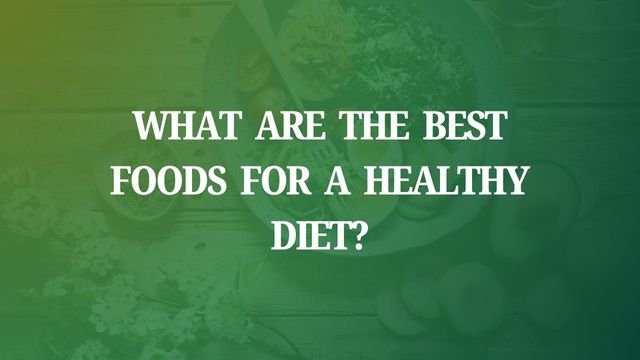What Are the Best Foods for a Healthy Diet?
A healthy diet is essential for maintaining good physical and mental well-being. It provides the body with the necessary nutrients to function efficiently, maintain a healthy weight, and reduce the risk of chronic diseases. You can take Kamagra Gold 100 Mg and Kamagra Oral Jelly 100 Mg to cure your impotence. Here are some of the best foods that contribute to a well-balanced, nutritious diet:
1. Leafy Greens
Leafy greens like spinach, kale, Swiss chard, and collard greens are powerhouses of nutrition. They are low in calories but packed with vitamins A, C, and K, as well as folate, iron, calcium, and fiber. These vegetables support heart health, improve digestion, and strengthen bones. Additionally, they are rich in antioxidants, which help protect cells from damage and may lower the risk of cancer.
Incorporating them into your diet: Add leafy greens to salads, smoothies, or stir-fries for a nutrient boost.
2. Berries
Berries such as blueberries, strawberries, raspberries, and blackberries are excellent sources of vitamins, fiber, and antioxidants. They are particularly high in vitamin C, which supports immune function, skin health, and iron absorption. Berries are also rich in flavonoids, compounds linked to better heart health, lower inflammation, and improved cognitive function.
Incorporating them into your diet: Enjoy berries as a snack, add them to yogurt, oatmeal, or blend them into smoothies.
3. Whole Grains
Whole grains, including brown rice, quinoa, oats, and whole wheat, are important components of a healthy diet. They are rich in fiber, B vitamins, iron, and magnesium. The fiber in whole grains supports healthy digestion, promotes feelings of fullness (which can help with weight management), and helps reduce cholesterol levels. Whole grains also provide sustained energy and help stabilize blood sugar levels.
Incorporating them into your diet: Use whole grains in place of refined grains like white rice or white bread. Include them in soups, salads, or as side dishes.
4. Healthy Fats
Fats are essential for brain health, hormone production, and nutrient absorption, but not all fats are created equal. Healthy fats, particularly those found in nuts, seeds, avocados, and olive oil, are beneficial for heart health. Omega-3 fatty acids, found in fatty fish like salmon, mackerel, and sardines, are particularly important as they help reduce inflammation and support brain and heart health.
Incorporating them into your diet: Add avocado to salads or toast, use olive oil for cooking, and snack on nuts and seeds. Aim to eat fatty fish at least twice a week.
5. Legumes
Legumes such as beans, lentils, chickpeas, and peas are high in protein, fiber, and various vitamins and minerals like folate, magnesium, and potassium. They are an excellent source of plant-based protein for vegetarians and vegans. Legumes can help manage blood sugar levels, improve digestion, and promote heart health.
Incorporating them into your diet: Include legumes in soups, stews, salads, or as a protein substitute in meals.
6. Lean Protein
Protein is vital for muscle maintenance, cell repair, and enzyme production. Lean protein sources like chicken, turkey, tofu, and legumes provide these essential nutrients without the excess fat found in some red and processed meats. Eating lean protein supports muscle recovery, promotes satiety, and may aid in weight management.
Incorporating them into your diet: Opt for grilled or baked lean meats, and include tofu or tempeh as plant-based alternatives.
7. Dairy or Dairy Alternatives
Dairy products such as milk, yogurt, and cheese are rich in calcium, vitamin D, and protein, all of which are important for bone health. For those who are lactose intolerant or prefer plant-based options, fortified dairy alternatives like almond milk or soy yogurt provide similar nutrients.
Incorporating them into your diet: Choose low-fat dairy or unsweetened dairy alternatives to limit added sugars and unhealthy fats.
8. Nuts and Seeds
Nuts and seeds are nutrient-dense foods that provide healthy fats, protein, fiber, and a variety of vitamins and minerals, including vitamin E, magnesium, and zinc. Regular consumption of nuts and seeds has been linked to reduced inflammation, improved heart health, and better weight management.
Incorporating them into your diet: Snack on a handful of almonds, walnuts, or chia seeds, or sprinkle them over salads and yogurt.
9. Cruciferous Vegetables
Cruciferous vegetables like broccoli, cauliflower, Brussels sprouts, and cabbage are known for their high fiber content and cancer-fighting compounds like sulforaphane. These vegetables are also rich in vitamins C and K and support healthy digestion, reduce inflammation, and may help prevent certain types of cancer.
Incorporating them into your diet: Roast, steam, or stir-fry cruciferous vegetables, and add them to meals throughout the week.
10. Herbs and Spice
Herbs and spices like turmeric, ginger, garlic, and cinnamon not only add flavor to dishes but also offer various health benefits. Turmeric has anti-inflammatory properties, ginger aids digestion, and garlic supports heart health. Adding herbs and spices to meals can help reduce the need for added salt and sugar, making them great for overall health.
Incorporating them into your diet: Season dishes with fresh or dried herbs and spices to enhance flavor and boost nutrition.
Conclusion
A healthy diet is diverse, balanced, and rich in nutrients that support overall well-being. Incorporating a variety of fruits, vegetables, whole grains, lean proteins, healthy fats, and spices into daily meals can help ensure you meet your body’s nutritional needs. Making conscious choices about what you eat can lead to better health outcomes, including reduced risk of chronic diseases and improved energy and mood.






